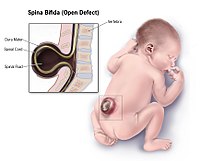
Photo from wikipedia
ABSTRACT Objective: Maternal stress is associated with adverse child outcomes. Conception to 2-years postpartum (the first 1000 days) is a developmentally sensitive period for stress exposure. The role of maternal… Click to show full abstract
ABSTRACT Objective: Maternal stress is associated with adverse child outcomes. Conception to 2-years postpartum (the first 1000 days) is a developmentally sensitive period for stress exposure. The role of maternal stress in the first 1000 days on child obesity risk is unclear. This review systematically examines the relationship between maternal stress across the first 1000 days and child obesity risk. Methods: The Cochrane Library, MEDLINE, PsycINFO, EMBASE, CINAHL, and Maternity and Infant Care were searched from inception to June 2018. Eligible studies included women who experienced maternal stress in the first 1000 days; an included a measure of maternal stress and of child anthropometrics. Results: Sixteen studies met inclusion criteria, the majority of these examined prenatal stress exposure. Inconsistent effects were observed for psychological and physiological stress responses, on child weight outcomes. Environmental stress exposures, including natural disaster and bereavement, were more consistently associated with increased obesity risk. Conclusion: This review does not provide support for the effects of psychological or physiological maternal stress on child weight outcomes; there is some evidence of associations between environmental stress exposures and greater childhood adiposity. Variation in conceptualisation and measurement of stress, timing of stress exposure, and limited examination of stress-related behaviours were noted.
Journal Title: Journal of Reproductive and Infant Psychology
Year Published: 2020
Link to full text (if available)
Share on Social Media: Sign Up to like & get
recommendations!